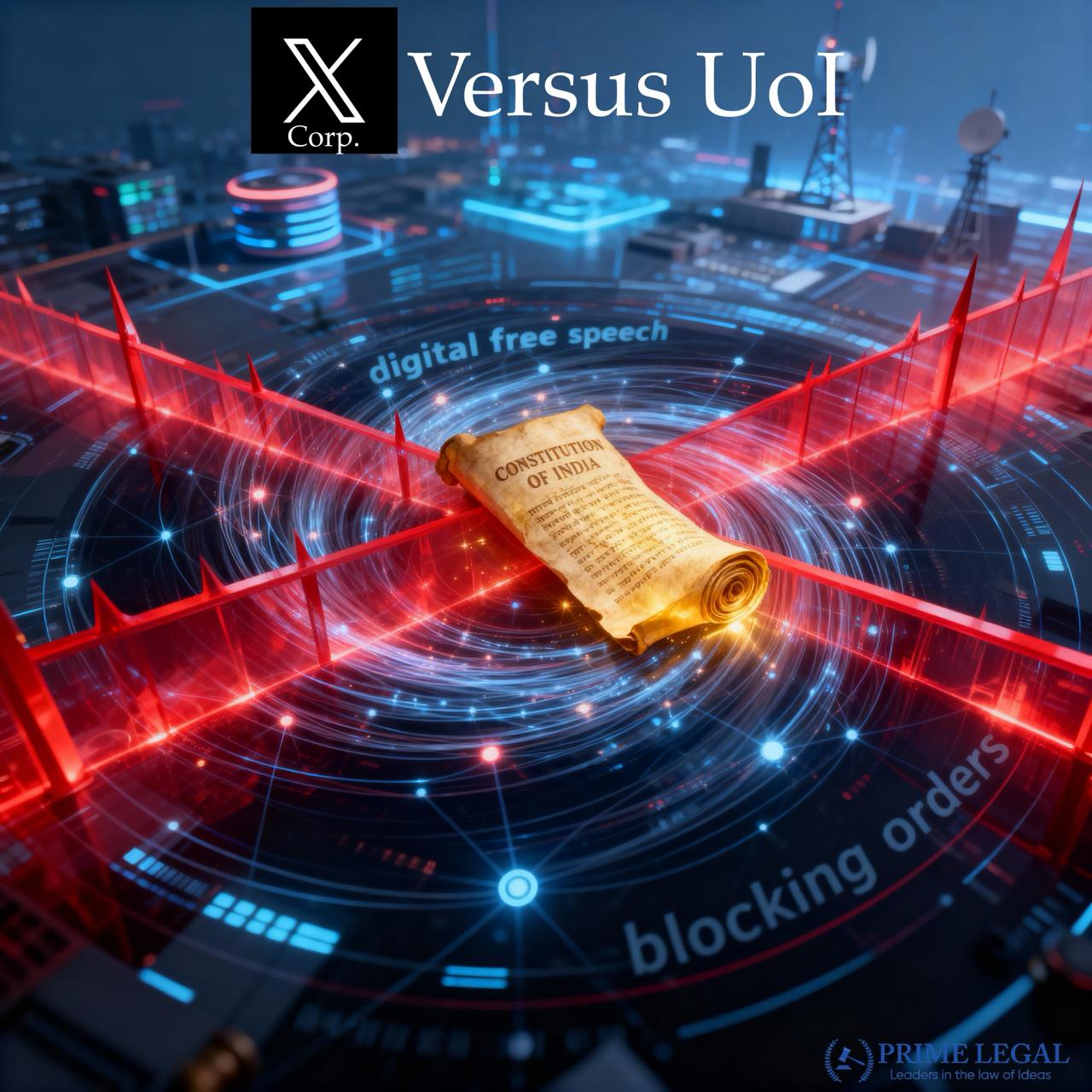FACTS
The petitioner, X Corp (formerly Twitter), contested the validity of numerous blocking orders issued by various Union Ministries and State authorities under Section 79(3)(b) of the Information Technology Act, 2000 (IT Act), and Rule 3(1)(d) of the Information Technology (Intermediary Guidelines and Digital Media Ethics Code) Rules, 2021. The company asserted that, in its view, Section 79 is a safe-harbour provision and does not confer a general power upon executive authority to issue blocking orders, contending that Section 69A of the IT Act read with the 2009 Blocking Rules provide the lawful mechanism by which blocking orders can be issued. X Corp further criticized the constitutionality of Rule 3(1)(d) of the 2021 Rules and the Sahyog Portal, which permitted nodal officers in various States to direct intermediaries to remove or disable access to ‘[un]lawful’ content. Several notifications empowering central and state officials to issue content takedown notices were also challenged.
ISSUES
Whether Section 79(3)(b) of the IT Act empowers the Government to issue blocking orders, or if such orders are confined to Section 69A.
Whether Rule 3(1)(d) of the IT Rules, 2021 is ultra vires the IT Act and unconstitutional for going beyond Article 19(2) restrictions.
Whether the Sahyog (Censorship) Portal is ultra vires the IT Act and unconstitutional.
Whether a foreign company like X Corp can enforce fundamental rights under Article 19, as opposed to the rights being limited to its citizens only.
Whether the large-scale delegation of the power to nodal officers to issue takedown orders violates the provisions of Articles 14 and 19 of the Constitution.
LEGAL PROVISIONS
- Information Technology Act, 2000 – sections 69A and 79(3)(b).
- Information Technology (Procedure and Safeguards for Blocking for Access of Information by Public) Rules, 2009.
- Information Technology (Intermediary Guidelines and Digital Media Ethics Code) Rules, 2021 – Rule 3(1)(d).
- Constitution of India – articles 14, 19(1)(a), 19(2).
ARGUMENTS
Appellant (X Corp):
The petitioner stated that Section 79 is an exemption provision and must not be read as a power-conferring provision to restrict content. Only S.69A is constitutionally sustainable, which provides a legal review process for content take-down orders, as held in Shreya Singhal. Rule 3 (1)(d) of the 2021 Rules creates ambiguity and allows for overbroad powers to censor and restrict users without the frameworks of reasonable restrictions under Article 19(2). The delegation of powers to thousands of nodal officers allows for arbitrary censorship, which would violate Article 14. Even if Article 19 rights would normally be citizen-centric, Article 14 applies and offends for all persons, including corporations.
Respondents (Union of India): The Solicitor General argued that given the nearly 98 crore internet users in India, unregulated speech is a riot or a menace to national integrity and public order. Section 79(3)(b) conditions the safe harbour of the intermediaries, and entitles protection only on the removal unlawful content. Further, the protections under Article 19 are not availed to foreign corporations like X Corp, therefore there is, in fact, no violation of a fundamental right. The delegation of powers of the nodal officers are just a statutory machinery to enable the government to act swiftly against disinformation and the threats to integrity. It is altogether clear that free speech cannot be held as absolute speech but must adhere to reasonable restrictions under Article 19(2).
ANALYSIS
The Court reviewed the relationship between sections 69A and 79 of the IT Act. The court noted that section 69A is a complete code, providing checks on blocking content while section 79 provides mere conditional immunity to intermediaries. The court assessed if rule 3(1) (d) of the 2021 Rules abrogated the enabling provisions in the parent statute and to give censorship power without safeguards. The court assessed if foreign corporations could take recourse to Article 19, noting that although free speech was confined to ‘citizens’ as under Article 19(1)(a), Article 14 assures non-arbitrariness to ‘all persons’. Finally, the court pointed out that an unchecked delegated power of censorship by the state was likely to lead to arbitrary action.
JUDGMENT
The High Court partly allowed the petition. It held that blocking orders must strictly follow the procedure under Section 69A of the IT Act and the 2009 Rules. Section 79(3)(b) does not empower authorities to issue blocking directions. Rule 3(1)(d) of the 2021 Rules was read down to align with Article 19(2), and authorities cannot rely on it to issue independent blocking orders. The Sahyog Portal was declared unconstitutional to the extent it enabled nodal officers to issue direct censorship orders. The Court was not ready to acknowledge Article 19(1)(a) because its protections do not apply for foreign corporations, however, it would abide by Article 14, to ensure executive action would not be questioned as arbitrary.
CONCLUSION
This decision bolster’s India’s legal structure regarding online speech, making it explicit that Section 69A is the only statutory mechanism for blocking content, while safeguarding procedural fairness as well as judicial oversight. The ruling constrains executive power at a time of arbitrary takedown options, while encouraging a regulation of some sort in the digital space. The court also indicated that, even in the face of the threat of misinformation, censorship should be kept in check within the limits of constitutional power.
“PRIME LEGAL is a full-service law firm that has won a National Award and has more
than 20 years of experience in an array of sectors and practice areas. Prime legal falls into the category of best law firm, best lawyer, best family lawyer, best divorce lawyer, best divorce law firm, best criminal lawyer, best criminal law firm, best consumer lawyer, best civil lawyer.”
Written by- Anwesha Anant
For reading more: X Corp. v. Union of India & Ors.


